- Home
- Clarice Lispector
The Besieged City Page 2
The Besieged City Read online
Page 2
But another way to read Lucrécia’s “objectification” appears when placed alongside Simone de Beauvoir’s The Second Sex, also published in 1949. This book, too, shows how women see and are seen. Beauvoir understands human relations as a battle of gazes, and the battle between men and woman is fought between one who looks and one who is looked at; subject and object; master and slave. The male gaze is the default, to which women must adapt. Male pronouns are universal: “man” encompasses woman but “woman” does not encompass man. Man is the first sex. Woman is the second.
Woman therefore “becomes an object; and she grasps herself as an object,” Beauvoir writes. “Once she has accepted her vocation as sex object, she enjoys adorning herself.” This is the objectification — particularly Lucrécia’s tacky, frivolous savoring of it — that Clarice Lispector ironizes. Lucrécia lacks the fire, the rebelliousness, of the girls in Clarice’s early stories. Instead, like the objectified women Beauvoir describes, she endeavors to make herself into a thing — and succeeds.
To do so, a woman must discern, distinguish, foresee, look, observe, perceive, see, seem, spy, watch. Her tool in this underground work is the mirror, which, properly employed, will help her turn herself into an ideal — a shiny object, a public statue. In the mirror, she contemplates “her marvelous double,” Beauvoir writes: “the promise of happiness, a work of art, a living statue.” Lucrécia is “a statue at whose feet, during civic festivals, flowers would be placed,” and who aspires to be a faceless Greek fragment: “Dreaming of being Greek was the only way not to scandalize oneself.”
At first, Lucrécia, like the horses, kicks; she, too, has hooves. Through contemplating herself at the mirror and cannily adapting to its demands, she is dehorsed. Marriage completes the task begun in girlhood: “The recently married woman felt it had been years since she’d seen a cow or a horse.”
*
After the second edition of 1964, Clarice would not muck with the text again. But she never spoke of any of her books as insistently as she spoke of this one. She often mentioned it in interviews. “I was pleasantly surprised to learn that some people who had read The Besieged City and who hadn’t liked or understood it on their first reading, identified more with the work when they reread it,” she said in 1960. In 1970, she wondered, in response to an unnamed critic’s incomprehension: “Does this mean I couldn’t bring to the fore the book’s intentions?”
In A Breath of Life, the great work left unfinished at her death, Clarice Lispector returned one last time to this book. The writings she produced in the three decades since she began The Besieged City unfolded numinous meanings that are only latent — subjacent — here. They provide the key that was missing at the time of publication. A retrospective knowledge of Clarice Lispector’s work shows that Lucrécia’s thing-ness is not merely sexual, or sociological: it represents the mystery of the creation, by God, of the being — and the creation, by the being, of the thing.
“The object — the thing — always fascinated me and in a certain sense destroyed me. In my book The Besieged City I speak indirectly about the mystery of the thing. The thing is a specialized and immobilized animal,” she wrote in A Breath of Life. The word “thing” acquires layer upon layer of resonance in Clarice’s work, and comes, finally, to represent an aspiration, both linguistic and spiritual. “People speak, or rather, used to speak so much about my ‘words,’ about my ‘phrases,’ ” she wrote of this book. “As if they were verbal. Yet not one, not a single one, of the words in the book was — a game. Each of them essentially meant some thing.”
The objectification of Lucrécia is a warning, as it would have been for Simone de Beauvoir. But it is also a kind of terrifying ideal. “What did I mean to say through Lucrécia — a character without the weapons of intelligence, who aspires, nonetheless, to that kind of spiritual integrity of a horse, who doesn’t ‘share’ what it sees, who has no mental or ‘vocabular vision’ of things,” Clarice wrote in her answer to the critic in 1970. Lucrécia’s desire to escape from language connects her to other figures in Clarice’s work, from Virgínia in The Chandelier to Martim in The Apple in the Dark to G. H. in The Passion According to G. H. In that book, Clarice reveals the full horror of stripping away everything a person sees in a mirror: false personality; clichéd, received language; all the sticky deposits that gather on our animal soul, and give it, for ourselves and for others, an intelligible form.
It may seem ironic that any writer should seek to escape the “vocabular vision.” But Clarice Lispector was a mystic. That is why Lucrécia’s identification with the horses is so revealing, and fraught. She tries to drown wordlessness, “that feels no need to complete impression with expression,” with babble. As she does, she estranges herself from the perfect language, the language beyond words, “beyond thought.” The Greek word for horse is álogo — “unreasoning, without speech.” Could becoming a Greek horse be the only way to avoid scandalizing oneself?
*
Yet the struggle against objectification in the concrete, sociological, Beauvoirian sense — the struggle between intelligibility and unintelligibility — is present in this book too. The incomprehension that greeted this book had serious, nearly fatal, consequences for her career. Her next novel was rejected, year after demoralizing year, by every good publisher in Brazil — and by lots of bad ones, too. The Apple in the Dark would only come out in 1961, twelve years after The Besieged City.
Clarice spent the fifties in Chevy Chase, in the Washington suburbs. Far from home, unable to publish, struggling with one of her sons’ mental illness, she was also trapped in a marriage that, while unsatisfying, was not abusive or particularly miserable. Indeed, it offered advantages: a partner who loved her, stability for her children, financial freedom to pursue her writing. Marriage also allowed her to avoid the stigma that, in those days, attached to any Brazilian woman who left her husband.
Yet the battle did not relent between the diplomatic spouse — by all accounts she was exceptionally capable — and the creature “straight from the zoo” that explodes from her early books. She was tormented by awareness of the phoniness into which her husband’s role pressed her. “I remembered a time in which I arrived at the refinement (!?) of having the waiter at home pass fingerbowls to all the guests in the following way: every fingerbowl had a rose petal floating in the liquid,” she wrote.
Already in Switzerland, she was taking barbiturates. Throughout her years abroad, she struggled against what Sartre and Beauvoir called “bad faith” — the temptation to slide into anesthesia. The woman who makes herself an object was one of the three types of woman that Beauvoir catalogued as acting in bad faith; but the existentialists, who had seen the agonizing conflicts that arose under Nazi occupation, knew that the calculations leading to bad faith were not flippantly made.
Surrender, for many people, was a matter of life and death. It could be lavishly rewarded — and not only in the form of the hotels and haberdashers to which Lucrécia, following her marriage, ascends. The choice between Clarice Lispector and Clarice Gurgel Valente was not one that could be swiftly resolved. Beauvoir nonetheless insisted that a woman must choose freedom over the tawdry temptation of happiness.
The Besieged City was written amidst this struggle. This may be why, for every passage she clarified in her revisions, she left another rough — sometimes roughed it up more. To go through it carefully is to see passages as grammatically gristly as anything this difficult writer ever wrote. To see everything she left unexplained is to see her resistance to the reflexive — to see her wavering between good faith and bad.
Good faith meant commercial failure and critical befuddlement, the end of her marriage and the breakup of her family. But Clarice Lispector was not resigned to obyezloshadenie. In 1959, she left her husband and returned with her two sons to Rio de Janeiro. Then, in 1964, the year of the second edition of The Besieged City, she published The Passion According to G. H. It
made no concessions. The horses were back.
Benjamin Moser
Les Eyzies-de-Tayac, September 2018
The Besieged City
In heaven, learning is seeing;
On earth, remembering.
— Pindar
1 The Hill in the Pasture
“Eleven o’clock,” said Lieutenant Felipe.
He’d barely spoken when the church bells struck their first chime, golden, solemn. The people seemed to hear space for a moment . . . the banner in an angel’s hand froze trembling. But suddenly the fireworks rose and exploded amidst the chimes. The crowd, roused from the sudden sleepiness to which they had succumbed, abruptly started moving and once again cries burst out on the carousel.
Above the heads the lanterns were misting up quivering the vision; the fair stalls were warping as they dripped. When Felipe and Lucrécia reached the Ferris wheel the bell shook above the night filling the religious festival with emotion — the movement of the crowd became more anxious and freer. The population had flocked to celebrate the township and its saint, and in the dark the courtyard of the church was shining. Mixing with the burnt gunpowder the blackcurrant drink was lifting faces in nausea and darkening. Faces were appearing, disappearing. Lucrécia found herself so close to a face that it laughed at her. It was hard to notice that it was laughing at someone lost in the shadows. The girl also pretended to talk to Felipe, looking however into a stranger’s eyes that were filled by the brightness of a streetlamp: what a night! she said to the stranger, and the two faces hesitated: the carrousel was illuminating the air in twirls, the lights falling trembling . . . If any extraordinary thing were finally to happen in the township, it would come bursting into range of the military band, where children were wandering away from their mothers and shouting would be just another shout: the church square was fragile. And crackling with the chestnuts on the bonfire. Drowsy, stubborn, people were elbowing one other until joining the silent circle that had formed around the flames.
Once beside the fire, they’d stop and watch, reddened.
The flames were sharpening gestures, the enormous heads moving about mechanical, smooth. Some components of the afternoon procession, still in silky, tight clothes, were mingling with the spectators. Crowned with cardboard a sleepless girl was shaking her curls — it was Saturday night. Beneath her hat Lucrécia’s dimly lit face sometimes looked delicate, sometimes monstrous. She was peeking out. Her face had a sweet watchfulness, without malice, her dark eyes peeking at the fire’s mutations, her hat with the flower.
Once again dragged along by Felipe, they were now heading in an unknown direction through the crowd, pushing, feeling their way. Lucrécia was smiling with satisfaction. Her face wanted to advance but her body could barely go ahead because the festival was suddenly crammed, swept by a faraway initial contraction. She tried at least to free one of her hands and straighten her hat that dislodged over one eye was giving her happy face an expression of disaster. But Felipe was clasping her by the elbow protecting her and laughing . . .
The lieutenant was raising his head above the others and laughing to the heavens.
The girl could hardly stand this free laughter that was an outsider’s way of denigrating the poor festivity of Sāo Geraldo. Though she herself couldn’t fully dive into the center of the jubilation that sometimes would seem to crackle in the silence of the fire, sometimes whiz with the turns of the little horses — though she sought with her face the place from which the pleasure was gushing. Where could the center of a township be? Felipe was wearing his uniform. With the pretext of leaning against him the girl, blind, watchful, was running her fingers over the thick buttons. Suddenly they found themselves outside the festival.
They were in the almost-dark void because the people were cramming into the zone around the military band as if into a marked-off circle. From outside it really was strange to watch the inhabitants pressing into one another: the ones whose backs were already turned toward the void were struggling sleepwalking to get in. The young man and the girl were watching while shaking the dust from their clothes. Right then the bells in the tower struck faraway, peaceful . . . The church bells shook more forcefully, mingling with the delicateness of the other hours. Lucrécia got worried. Before long, the lieutenant barely able to keep up with her, the girl was moving ahead almost running. The main event of the night in Sāo Geraldo hadn’t even been announced, the small town was miraculously intact still— Felipe was laughing irritated: don’t run, girl! they turned the corner and found themselves in the square paved with stones. The clock tower was still trembling.
The plaza was naked. So unrecognizable in the moonlight that the girl didn’t recognize herself. Felipe too had halted relieved: damned people! he exclaimed pushing back his kepi. Saturday was the night of several worlds: the lieutenant coughed transmitting to one after the next his wordless voice. The windows trembled at the neighing. There was no wind blowing. Despite the moon the statue of the horse in darkness. You could see, only a bit more distinctly, the tip of the horseman’s sword suspending halted fire. The moonlight had stamped the thousand mute doors on the doors. And the square had been astonished into the crooked posture in which it had been touched. It was the same cold recognition as when you’d hear a blind man’s clarinet . . . The flagstones almost revealed, you could barely touch them with your boots. The girl even clapped two hands . . . Which separated immediately into a deaf salute — the whole square was applauding. In less than a second the palms broke apart and the odd bit of applause was snuffed out in the alleys undefined by the darkness. The girl listened a bit hostile, her two hands finally pushed her hat down decisively on her head. She said goodbye to Felipe telling him it wasn’t fitting to be seen together.
She’d just started walking by herself and was already regretting it because that was exactly what Sāo Geraldo wanted. She was walking restrained, mechanical, even attempting a certain irony. But her steps were multiplying and the stone square was marching. She stopped without warning, tied the laces of her boot . . . When she raised her head she decided not to forget to look at the narrowest house, the smallest shadow. The closed shops with their rolling gates of iron. She was being gentle with all of them. I’m really touching this lamppost, she thought with more confidence. The lamppost was freezing.
Moments later the music from the bandstand was brought by the air — the band was proliferating beneath the yellow lights. But the sound was holding back at the edge of the deserted streets. Lucrécia looked up too, with a bit of insolence. But in each window of the deserted city a man was swaying in the shadow of the blinds — the blinds were swinging. The young lady was trembling from fear of being alive. Certain things were giving the same sign — the lack of wind — a blind man playing an instrument — the moonlight on the stone . . . she quickly made the sign of the cross while a fat rat was sunning himself beneath the lamppost. Dry steps rang out. The soldier diminished by the distance appeared on one corner and disappeared on another . . . Saturday was the night for drunkards. A piece of paper was trembling on the ground: then she started to run before everything could start until she leaned against the door of her house. She pressed hard on the doorbell . . .
The unexpected stridence of the sound was crossing the dark space. The girl seemed to have rung the bell of another city. She waited a moment. But after having made her presence known with the doorbell she no longer dared keep her back turned: she started knocking with closed fists, the rat was running peacefully by the sleeping wagon; she was knocking and looking to the sky — the transported clouds seeming motionless and the moon passing by . . . she was knocking — knocking with closed fists looking at the sky, her hair growing longer in artlessness and horror, it was getting more and more dangerous, the houses upright . . . Finally from the top of the stairs they pulled the cord connected to the lock. With a creak the door was opening.
Then the bells suddenly shook in glass, scattered f
rom the band over the city, fireworks exploded. Things were breaking in disaster almost before she could take shelter — she shut the door hard.
Little by little, in the calming darkness, she let down her guard. She was still bristling, each tip that went back to being a thing couldn’t be touched, the twisted columns of the handrails. Also the size of Sāo Geraldo had widened and she saw from bottom to top — the immense stairway to climb. The bells were ringing. Dlin, dlen, dlin, dlen, she heard with attention. She imagined that the streets must have all lit up to the sound of the bells . . . The night now was golden. Lucrécia Neves had escaped.
The house where she lived was pierced with pipes and windows, which made it very weak — the girl was going up the steps that were trembling with the final vibrations of the bells.
The township of Sāo Geraldo, in the year 192. . . , was already mingling some progress with the smell of the stable. The more factories that opened on the outskirts, the more the township arose to its own life without the inhabitants’ being able to say what transformation was reaching them. Movements had already grown congested and you could no longer cross a street without dodging a wagon that the sluggish horses were pulling, while an impatient automobile was honking behind it spewing smoke. Even the twilights were now smoky and bloody. In the morning, amidst the trucks that were making their way to the new power plant, transporting wood and iron, baskets of fish were spread out on the sidewalk, arriving through the night from larger centers. From the houses disheveled women were coming down with pans, the fish were weighed almost by hand, while vendors in shirtsleeves were shouting out prices. And when above the happy morning movement the fresh and disturbing wind would blow, you’d think the whole population was getting ready for a journey.

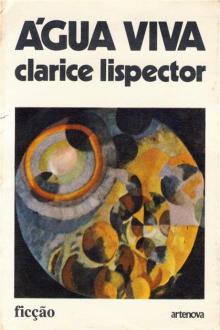 The Stream of Life
The Stream of Life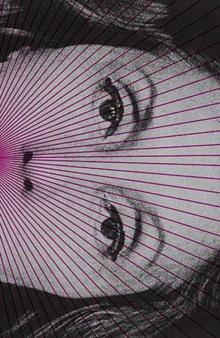 The Complete Stories
The Complete Stories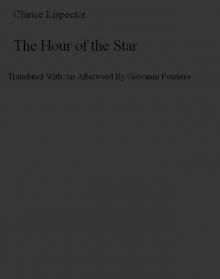 The Hour of the Star
The Hour of the Star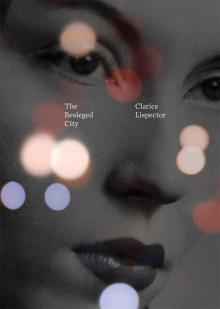 The Besieged City
The Besieged City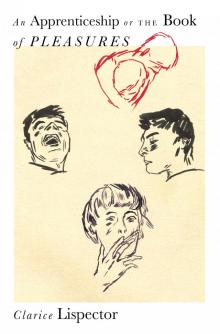 An Apprenticeship or the Book of Pleasures
An Apprenticeship or the Book of Pleasures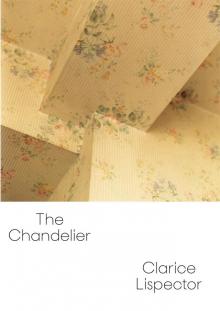 The Chandelier
The Chandelier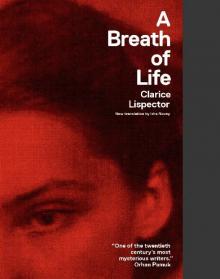 A Breath of Life
A Breath of Life The Apple in the Dark
The Apple in the Dark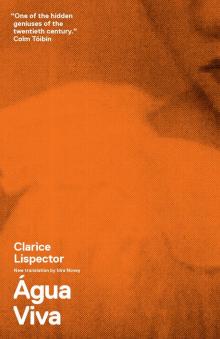 Agua Viva
Agua Viva Complete Stories
Complete Stories Near to the Wild Heart
Near to the Wild Heart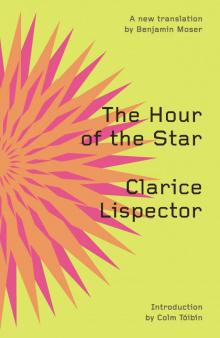 The Hour of the Star ()
The Hour of the Star ()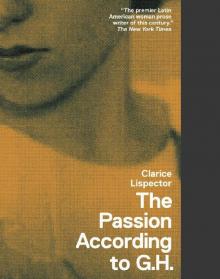 The Passion According to G.H.
The Passion According to G.H.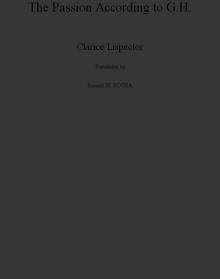 The Passion According to GH
The Passion According to GH